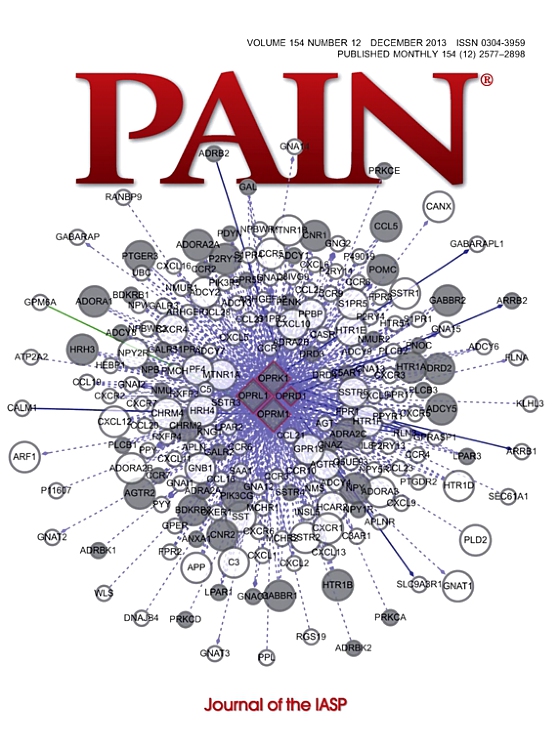The influence of genetic and epigenetic variations on dynamic experimental pain measures in adults with and without chronic musculoskeletal pain: a systematic review.
IF 5.9
1区 医学
Q1 ANESTHESIOLOGY
引用次数: 0
Abstract
Chronic musculoskeletal pain (CMP) is the most prevalent form of chronic pain. A subgroup of patients with CMP shows altered pain processing, including impaired endogenous pain modulation, as evaluated by experimental pain measures. One hypothesis is that genetic and/or epigenetic variants may contribute to individual differences in outcomes of dynamic experimental pain assessment. Therefore, a systematic review was performed to comprehensively summarize the current evidence regarding genetic and epigenetic influences on dynamic experimental pain measures in adults with and without CMP. The review was conducted following the Preferred Reporting Items for Systematic Reviews and Meta-Analyses guidelines. Four electronic databases were searched to identify relevant studies. Risk of bias and quality of evidence were assessed using the Newcastle Ottawa Scale and the Grading of Recommendations, Assessment, Development, and Evaluation approach, respectively. A total of 24 articles were included, accounting for 34 different regions of interest. Low-quality evidence indicated no association between the rs4680 single-nucleotide polymorphism (SNP) of the COMT gene or the serotonin-transporter-linked polymorphic region SNP of the SLC6A gene and conditioned pain modulation in healthy volunteers or in patients with CMP. In addition, low-quality evidence was found for the lack of an association between the rs1799971 SNP of the OPRM1 gene and conditioned pain modulation in healthy volunteers. Other genetic and epigenetic variants provided limited or conflicting evidence. For now, it seems that dynamic experimental pain measurements are robust to genetic and epigenetic variations. However, more reproducible research is warranted to better understand whether or not and how genetic and epigenetic variations influence (altered) pain processing, which is crucial for advancing both preventive and therapeutic strategies in CMP populations.遗传和表观遗传变异对有或无慢性肌肉骨骼疼痛的成人动态实验疼痛测量的影响:系统综述。
慢性肌肉骨骼疼痛(CMP)是最常见的慢性疼痛形式。CMP患者亚组显示疼痛加工改变,包括内源性疼痛调节受损,通过实验疼痛测量进行评估。一种假设是,遗传和/或表观遗传变异可能导致动态实验疼痛评估结果的个体差异。因此,我们进行了一项系统综述,全面总结了目前关于遗传和表观遗传对有和没有CMP的成人动态实验疼痛测量的影响的证据。本综述按照系统评价和荟萃分析指南的首选报告项目进行。检索了四个电子数据库以确定相关研究。偏倚风险和证据质量分别采用纽卡斯尔渥太华量表和推荐分级、评估、发展和评价方法进行评估。共收录了24篇文章,涉及34个不同的研究领域。低质量的证据表明,在健康志愿者或CMP患者中,COMT基因的rs4680单核苷酸多态性(SNP)或SLC6A基因的5 -羟色胺转运体相关多态性区域SNP与条件疼痛调节之间没有关联。此外,在健康志愿者中,OPRM1基因的rs1799971 SNP与条件疼痛调节之间缺乏关联的证据质量不高。其他遗传和表观遗传变异提供了有限或相互矛盾的证据。目前,动态实验疼痛测量似乎对遗传和表观遗传变异都很有效。然而,需要更多可重复的研究来更好地了解遗传和表观遗传变异是否以及如何影响(改变)疼痛加工,这对于推进CMP人群的预防和治疗策略至关重要。
本文章由计算机程序翻译,如有差异,请以英文原文为准。
求助全文
约1分钟内获得全文
求助全文
来源期刊

PAIN®
医学-临床神经学
CiteScore
12.50
自引率
8.10%
发文量
242
审稿时长
9 months
期刊介绍:
PAIN® is the official publication of the International Association for the Study of Pain and publishes original research on the nature,mechanisms and treatment of pain.PAIN® provides a forum for the dissemination of research in the basic and clinical sciences of multidisciplinary interest.
 求助内容:
求助内容: 应助结果提醒方式:
应助结果提醒方式:


